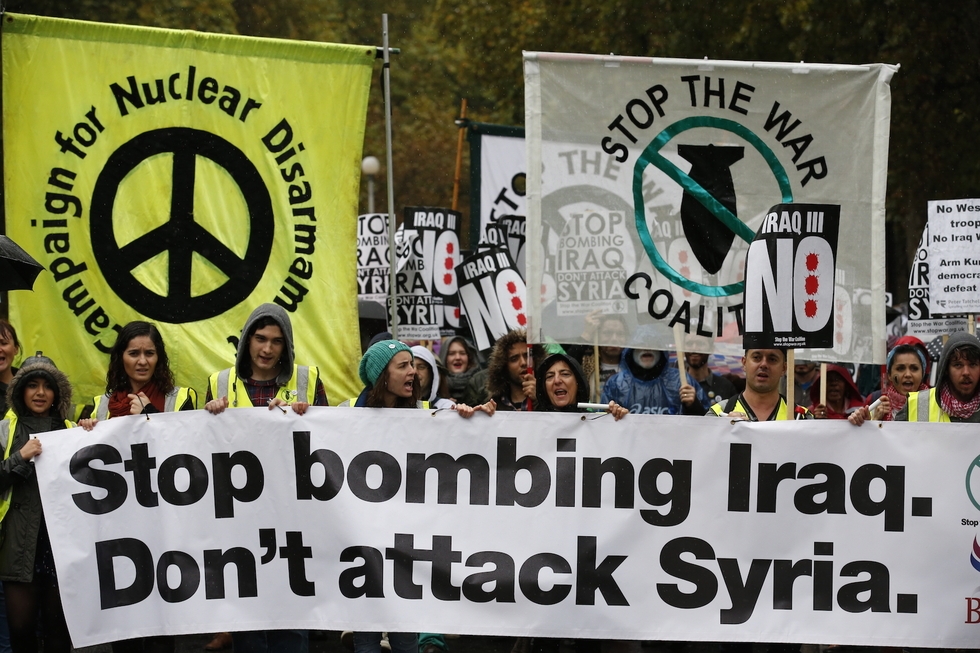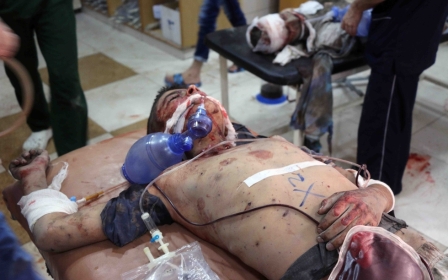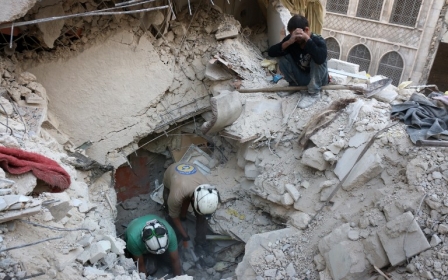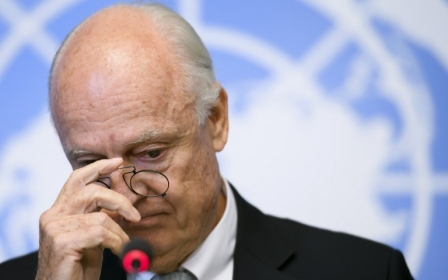Left-wing activists slam Stop the War for refusing to protest against Russia

Left-wing UK activists have slammed the Stop the War coalition (STWc) over its refusal to heed a call by British Foreign Secretary Boris Johnson to protest Russian air strikes on Syria.
The vice-chairman of Britain’s Stop the War coalition on Wednesday said he opposed protesting against Russian bombing of Syria because “the media and politicians” are trying to portray Moscow as the “only problem”.
Chris Nineham was interviewed by the BBC after Johnson on Tuesday urged his group to protest against the ongoing Russian bombardment of rebel-held east Aleppo.
Nineham said his organisation has protested against the Russian war in Syria with “statements” but that they would not be calling for a public rally to demand an end to Moscow’s backing of Syrian President Bashar al-Assad in his war against various rebel groups.
“We do not want to contribute to the jingoism and hysteria that is being whipped up against Russia, because that hysteria is being used to try and justify an escalation of the British war effort,” he told BBC Radio 4’s Today programme.
STWc's stance on Syria, however, has divided left-wing activists in the UK, many of whom believe there should be more grassroots action in support of Syrian civilians.
Mark Boothroyd, a Labour party activist and founding member of Syria Solidarity UK, said that the STWc position on Russia was "completely unprincipled".
"It's a betrayal of the principle they were founded upon, to oppose war, occupation, oppression - Syrians and solidarity activists have been calling on them for years to condemn these things," he told Middle East Eye. "This refusal is a bit shocking, because normally they would try and say 'yeah, we condemn it but we're not going to do any action', but to refuse to even demonstrate really shows which side they're on in this."
Boothroyd dismissed the oft-repeated argument by coalition that they only targeted their own government's actions as that was where they could apply leverage.
"Yes I think we should oppose Britain when it's doing things which are not good for the civilians of Syria, and its support for Israel and its backing of Saudi Arabia in its attack on Yemen, but we can also protest other countries when they're carrying out other barbarisms. It's just political consistency and speaking to principle."
Current leader of the opposition Labour party Jeremy Corbyn was a former president of the STWc and spoke at their conference on Saturday. His stance on Syria has been criticised by some of his own supporters, who argue he has been unwilling to sufficiently criticise the Assad government or condemn Russian bombing.
On Monday, a petition was launched by left-wing activists and Labour party members calling for a change in Corbyn's position on Syria, warning that "failure to act on this issue now threatens to undermine practically and politically much of the work done over many years by the anti-war movement."
Peter Hill, a member of the pro-Corbyn pressure group Momentum and signatory to the petition, told MEE that he believed that there should be active campaigning against Russia's actions in Syria.
"As the open letter to Jeremy Corbyn stated, I think that anti-war activists and socialists should condemn the actions of all states which commit acts of aggression and war crimes, not only those of Western powers or states aligned with the West," he said. "I too am sceptical about the motives and interests of Western powers involved in Syria, but I do not see this as a good reason to hedge about condemning Russia and the Assad regime, as the Stop the War Coalition have done.
"Protests at the Russian embassy are an entirely appropriate response to the atrocities committed by Russia in Syria."
According to the Syrian Observatory for Human Rights, the Russian bombing campaign in support of Assad, which began on 30 September 2015, killed more than 3,800 civilians in its first year, as well as nearly 6,000 fighters from militant groups. Since the collapse of the latest ceasefire in late September, SOHR has documented the deaths of 564 people, including 116 children and 42 women from Russian and government bombing.
Reuters on Monday reported that militia groups loyal to Assad had taken control of nearly half of rebel-held areas in east Aleppo.
Bombardment from Syrian warplanes and the Russian air force also destroyed the city's largest hospital and water works, which served more than 250,000 people.
More than 300,000 people have been killed in Syria since demonstrations against the Assad government in 2011 were met by a crackdown.
New MEE newsletter: Jerusalem Dispatch
Sign up to get the latest insights and analysis on Israel-Palestine, alongside Turkey Unpacked and other MEE newsletters
Middle East Eye delivers independent and unrivalled coverage and analysis of the Middle East, North Africa and beyond. To learn more about republishing this content and the associated fees, please fill out this form. More about MEE can be found here.




